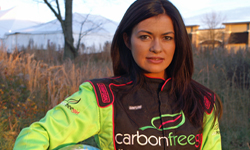 This article originally appeared on EcoStiletto.com, a website dedicated to sustainable, eco-friendly, green and organic fashion and health.
This article originally appeared on EcoStiletto.com, a website dedicated to sustainable, eco-friendly, green and organic fashion and health.
Leilani Munter encapsulates the ecoista’s dilemma: It’s all well and good to want to live sustainably until you work in an industry that doesn’t share your views. What are you supposed to do, quit your job?
Leilani takes this concept to an extreme most of us can’t even imagine. That’s because she is—if you haven’t already guessed from the photos—a racecar driver. Not just any racecar driver, mind you, Leilani has serious on-track cred. She’s the fourth woman in history to race in the Indy Pro Series. She set the record for the highest finish for a female driver in the history of the Texas Motor Speedway when she finished fourth in 2006. Sports Illustrated named her one of the top 10 female racecar drivers in the world.
The girl really can’t drive 55. More like 200.
But all that speed takes a serious environmental toll—and Leilani knows it. When we asked her what her eco-sin was she answered, “That’s easy: My racecar.”
Leilani also sees her profession as an opportunity to inspire positive change in the 100 million fans that make racing the number-one spectator sport in America. “If I was just another vegetarian, tree hugging, biology graduate asking people to give up meat and stop using plastic bags, I don’t know how many people would be listening to me,” Leilani told us. “But because I drive a racecar, I have an ability to reach a new audience of people that most environmentalists are probably not talking to.”
In addition to talking the talk with 100 million people, Leilani walks it: The longtime vegetarian and self-proclaimed “Carbon Free Girl” adopts an acre of rainforest for every race she runs. She regularly races in alternative fuel vehicles, like the Ford hydrogen fuel cell car she drove in last year’s VS Viking Rally in Norway. After the BP spill, she went down to help clean up—and produced an amazingly compelling video statement about what she found. And she’s the first Ambassador of the National Wildlife Federation.
But according to Leilani, “We don’t move the needle at all by talking to a bunch of people who already agree with us. The way we create change is by starting a dialogue with those who don’t.” With that idea in mind, she created a very visible on-track “Eco Dream Team” to promote her activism to fans. And she repeatedly heads to Capitol Hill to speak on behalf of clean energy and climate change legislation—no choir there.
When did you start getting involved in eco-consciousness?
I grew up spending time in nature in Minnesota so as long as I can remember, I have been conscious of taking care of our environment and all the creatures that live here. As my racing career progressed, I realized that as a driver I had the ability to reach a large audience about the environmental challenges we are facing.

Photo by Douglas Murray
How important do you think these kinds of changes are for you, personally?
I’m just trying to do my part. At home we have an organic vegetable garden fueled by our compost, we have a rainwater collection system, solar and LED lighting. We do what we can to have as little impact as possible.
I think the more your eyes open up to your impact on the planet, the more overwhelming it gets because you start to realize the impact of everyone around you and ultimately, the more strict you become with your own behavior.
If I get to the grocery store and have forgotten my canvas bags at home, I’ll carry all my groceries out in my hands. I probably look ridiculous but I just can’t take a plastic bag anymore—even though I would recycle it, I feel too guilty to even take one home.
I realize that I’m just one person, but these small changes, multiplied by millions, can make a big difference.

Photo by Shawn Mahoney
Humans have been living on this planet as if there were no consequences to our actions, pouring millions of tons of greenhouse gases into our atmosphere every day, filling up landfills, polluting our oceans, destroying the rainforests.
The way we’ve been living is not sustainable and that has got to change.
But if we, the consumers, demand that these changes to take place, both on Capitol Hill and in corporate America, we can change things because we drive the market.
If we demand change from the people who make the products we buy, in part by only supporting companies that have sustainable practices, then the others will have no choice but to change.

Photo by Victoria Jacob
So speaking of supporting sustainable companies, what are your favorite green fashion labels?
I was thrilled that Natalie Portman came out with a vegan shoe line [Te Casan]. As a vegetarian that loves cool shoes, I love seeing moreleather free shoes out there. I also have three older sisters who pass along some beautiful hand me downs, so I guess you could say I wearrecycled fashion!
What your the favorite eco-friendly beauty finds?
Josie Maran has a great eco-friendly beauty line. I met Hannah Wood a couple of years ago; she has a great line of lip balm called Blabbermouth that I love to use. I also recently picked up some Eco Tools make up brushes. I really love seeing that more and more eco friendly options are being offered.
What’s the biggest green change you’d like to make in your life—even if it’s impossible right now?
Solar panels for my house. I’m also talking with different solar companies about a marketing partnership so I can promote solar to the racing community. I’d love to own and promote a high performance electric car like a Tesla or a Karma by Fisker. Like I always say, just because you’re green, doesn’t mean you can’t be fast!

Photo by Shawn Mahoney
What’s your favorite eco-friendly tip our readers should know about?
I want everyone to realize how much a choice at the dinner table can affect our environment. The single most important thing that you can do to help our planet is to cut back or, even better, give up eating meat.
Grazing animals produce methane, which is 21 times more heat trapping than CO2. A UN study found that 40 percent more greenhouse gas emissions come from raising the animals that we eat than all the world’s cars, SUVs, planes, trains, ships and all other forms of transportation.
Not to mention world hunger! If Americans alone reduced their meat consumption by just 10 percent, it would free up enough land to grow 12 million tons of grain – enough to save the six million children under the age of five that die every year as a result of hunger.
One acre of land can produce 165 pounds of beef—or 20,000 pounds of potatoes. And it takes 23 gallons of water to produce a pound of tomatoes; in comparison, it takes 5,214 gallons of water to produce just one pound of beef.
I know that not everyone reading this is going to become vegetarian, but I hope they will at least try to reduce their meat consumption, even if it’s just one day a week like meatless Monday!
Do it for the environment, do it for animal cruelty, and do it for world hunger. As Ralph Waldo Emerson once said, “You have just dined, and however scrupulously the slaughterhouse is concealed in the graceful distance of miles, there is complicity.”

Photo by Crag Davidson, as is the lead photo
Who’s your eco-idol and why?
I have two eco-idols: Ric O’Barry and Louis Psihoyos. Their eco-thriller documentary “The Cove” has brought to attention not only to the plight of the dolphins in Japan, but also the very serious issues of overfishing and mercury contamination in our oceans. They were able to get these critical issues in front of a world audience and they did it in a very entertaining way.
It’s a thriller, it’s like a spy movie, but so much more intense because it’s real. These guys risked their lives to make this film. I think that in order to take a message mainstream it has to be entertaining, it has to captivate people and that’s hard to do. They did this brilliantly. I’ve had five screenings of the movie at my home in the last month and have another scheduled later this month. This film is so important; everyone needs to see it. I am getting DVDs of it for all my family and friends.
What’s your worst eco-sin?
That’s easy: My racecar. It’s part of my job so it’s unavoidable. But if I was just another vegetarian, tree hugging, biology graduate asking people to give up meat and stop using plastic bags, I don’t know how many people would be listening to me. But because I drive a racecar, I have an ability to reach a new audience of people that most environmentalists are probably not talking to. It gives me a platform to start a dialogue and ultimately create change.
What’s the best green advice you ever received—and who gave it to you?
To follow my heart. Both my parents believed in me, and they made it possible for me to believe in myself.




One response to “Leilani Munter: Life is Short. Race Hard. Live Green.”